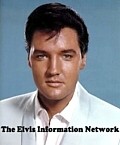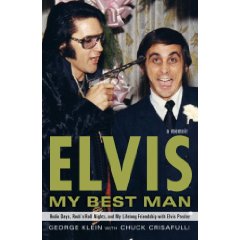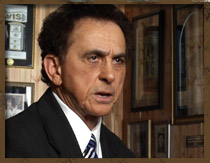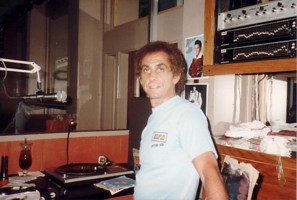 |
 |

Reviewed by Susan MacDougall, Feb 2010
Publishing details: Elvis: my best man, by George Klein with Chuck Crisafulli, Crown Publishers, New York, 2010. 306 pp. .............................................. Elvis: my best man relies on memory for the most part, as George Klein (‘GK’) acknowledges. He has tried to ensure that his memory lined up with documented facts - but more on that later. Klein came from a deprived background, like Elvis, and suffered various career ups and downs. He was at Humes High School with Elvis from eighth grade in November 1948 and attended several of the same classes. He knew Elvis, although he was not a close friend at the time. Like many Memphis teenagers, Klein listened to the all-black WDIA Memphis radio station and WHBQ’s “Red, Hot and Blue”, hosted by Dewey Phillips. This inspired Klein to aim for a career in the media. He held various jobs in radio and, later, television, at one time being Dewey Phillips’ “babysitter” at WHBQ. Dewey, Klein and Elvis met up sometimes and would go together to Beale Street. After losing his radio show at WMC in 1957, Klein was hired by Elvis as a travelling companion. Getting back to his career, Klein eventually took a job offered by Sam Phillips at WHEY radio station. While Elvis was in Germany, Klein and Elvis kept in telephone contact, and Klein regularly sent Elvis boxes of new records. After Elvis returned from Germany and resumed his career, Klein could only join him in his spare time at Graceland, Hollywood or Las Vegas. Klein also relates experiences with Elvis over the later years, but during that period he saw less of Elvis than the Memphis Mafia. The later years have been well documented. Elvis: my best man consists of an Introduction, 16 chapters, an Epilogue, a ten-page index and eight pages of black and white photographs in the middle. Chapters 1 to 7 cover the years 1948 to 1959 (11 years). Chapters 8 to 16 cover the years 1960 to 1977 (17 years). The stated purpose of the book is to document some of the important things about Elvis that have been missed elsewhere, especially “his deep, natural intelligence and how funny he was”. There are certainly some entertaining anecdotes, such as putting a gift-wrapped box of snakes on a car seat to frighten thieves, and Elvis hiding under a train to escape a horde of sorority sisters.
"For instance (and this is Klein's version, where memory of details may be suspect), on May 1st 1957 MGM staff tried to stop Elvis singing gospel songs with the Jordanaires, resulting in Elvis walking out. Elvis had felt uncomfortable at having to record on a large movie-lot soundstage. He would have preferred a small studio for the acoustics. He needed to warm up and be in the right frame of mind to record. After the walk-out, Elvis smashed up his penthouse hotel suite at the Beverly Wilshire. The incident was covered up, and the hotel management was told that the damage was the result of a wild party. Klein is unsure whether Elvis came out of his room until a whole day later for the rescheduled recording session. After reading four chapters, it became obvious why others around Elvis might object to Klein’s book. Klein claims Elvis as his closest friend, talked to him privately and gave him advice, and influenced a number of Elvis’s decisions based on his own radio and television experience and the entertainers and celebrities he knew. Everybody who knew Elvis probably wants to think they were important to him. But claiming a special relationship can cause an adverse reaction amongst others who were around Elvis. Jerry Schilling diplomatically starts his book Me and a guy named Elvis (Penguin, NY, 2006) with the sentence “I wouldn’t want to speak for Elvis Presley and tell you that I was his best friend. But I can tell you this: he was my best friend.” Klein’s ghost writer, Chuck Crisafulli, who was also Schilling’s ghost writer, would have done Klein a better service if he had portrayed him in a somewhat more modest light. Marty Lacker (who, incidentally, Klein claims to have introduced to Graceland) slams Klein for several errors concerning an occasion in January 1969. Leaving aside the scorn and derision which detracts from his case, Lacker insists that he, not Klein, was sitting next to Elvis and that he, not Klein, was instrumental in talking Elvis into recording at the American Sound Studios; also, that Tom Diskin, Freddy Bienstock and others were not present as stated. Here we are faced with the “fragile nature of memory”. Where some events have not been fully documented, the truth can become a battle of memories and maybe also of egos. If Lacker is right about the January 1969 incident, faulty memory on Klein’s part of one event does not necessarily discredit the whole book. All the same, it might give cause to wonder if there are more misremembered events. Lacker claims to have a photographic memory and total recall of conversations, even 40 years later, as well as witnesses who agree with him.
Elvis: my best man is easy reading, entertaining and touching in places, providing a sympathetic portrait of Elvis Presley. Probably the most insightful part of the book is its coverage of Elvis’s early years, since many other people have provided copious accounts of the later years. How many accounts of any particular incident vary or clash due to faulty memory, and how do we determine what really happened? Klein was a good friend of Elvis’s who discussed matters with him, supported and advised him over the years. The set of books by people who were close to Elvis would be incomplete without one by George Klein. It never ceases to amaze me that Elvis is loved so much by so many loyal friends who still miss and think about him daily, even so long after his death, whether or not they can stand each other. Susan MacDougall February 2010 Your Feedback
Bobby Wysner: All of Susan's reviews are informative and insightful. I feel her review of GK's book is pretty much on the mark. I have been looking forward to a book by GK for years. "My Best Man" is interesting and I'd recommend it. But I think this book is disappointing because it is too lightweight. There is not as much substance to it as I had hoped. As far as deciding who to believe regarding the events leading up to Elvis's legendary 1969 American recording sessions - Marty Lacker or George Klein - this is one that we are just going to have to come to our own conclusions. The important thing is that Elvis DID record at American and whoever is to thank, Marty or GK, we are all thankful. (As for the strange comment that a fan wrote on this thread regarding how "the critics and not the fans are the ones who like "From Elvis In Memphis." I find it unsettling that ANYONE, fan of Elvis, music critic, or whomever - would dislike the album From Elvis In Memphis. This is the most important album Elvis every made. And along with Elvis Is Back, is the best album Elvis ever made. Without those sessions at American in 69, Elvis' comeback would not have been complete.) From my personal experiences with George Klein. I have been fortunate to have met and talked with him 4 different times. I've always found him very nice and sincere. He was friendly each time. But I wish the book was more substantial. I like that GK included chapters about his own radio career, but I wish he had written even more about it. That's why it's ironic that so many fans and Elvis people are saying that GK is too self- important. Because he has had an important and significant broadcasting career totally unrelated to Elvis. I'm not saying that other's opinions about GK's are not accurate. It's just that my experiences have been very positive. Good book, and excellent review by Susan. And to the person that claims that "it's only critics and not Elvis fans who like "From Elvis In Memphis" - you are so wrong that you are off the charts. I've never met an Elvis fan who didn't like From Elvis In Memphis. Helen Rose (Australia): Susan MacDougall wrote: "How many accounts of any particular incident vary or clash due to faulty memory, and how do we determine what really happened?" Excellent comment, Susan! I actually struggle with this on a daily basis with friends, family, work colleagues and myself, let alone a guy I never met and people’s memories from 33-70 years ago! Sarah: I liked your review. It didn't ignore or criticise GK for some of his facts. Sam: George Klein's book is full of shite!!! We don't need any more 'insider' biographies, they're all the same exaggerating each writers role in Elvis's life. dailyone@australiaonline.net.au: This is confusing who now do i blame for Elvis's most uncommercial but critics not fans album "Elvis in Memphis"., Lacking or i dklein. This is not a classic album, I've never seen this album in any other collection but Elvis Fans . The last i heard in sales it was only 5000. Its a boring stinker. Bronwyn Tighe: I met George at Elvis Week in the 1990's and found him to be good to talk to but over the top about his friendship with Elvis. So when his book came out I was in two minds about reading it but Susan MacDougall's balanced review has convinced me to give it a go. Copyright the Elvis Information Network. .
. |
|





